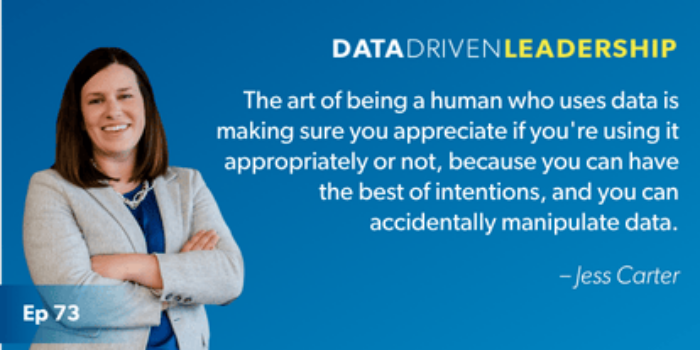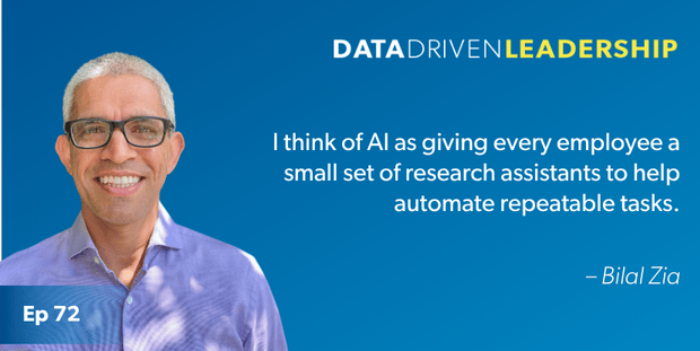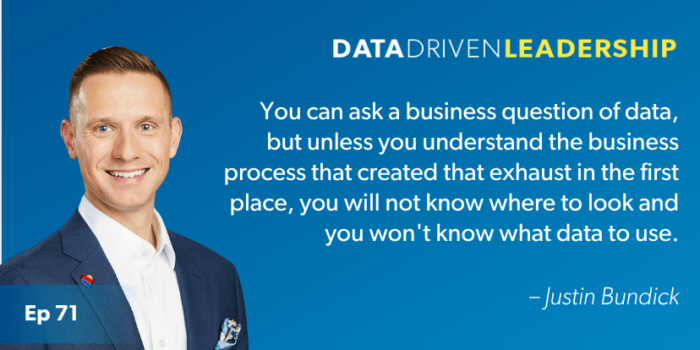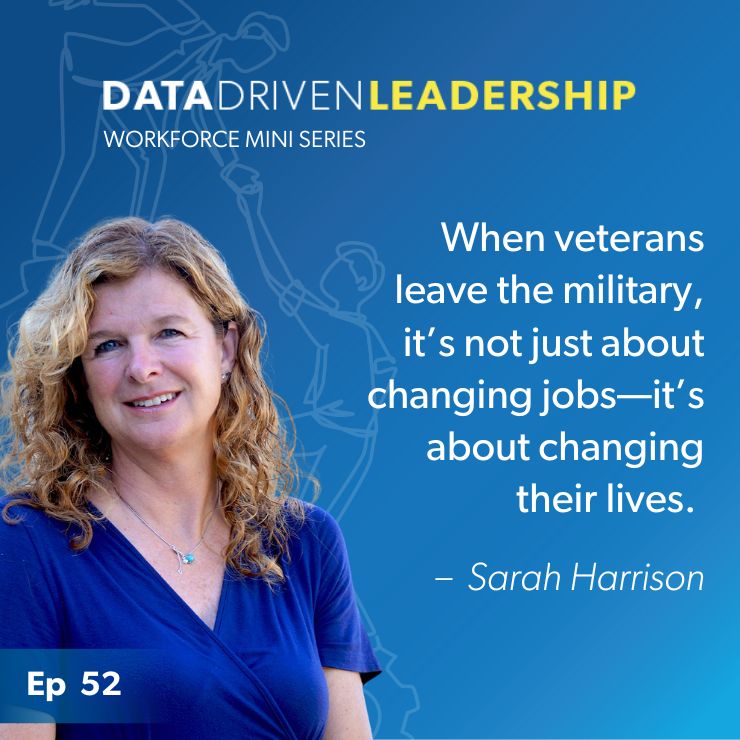
How INvets Uses Data to Help Veteran Families, Employers, and the State with Sarah Harrison
Make a difference for citizens, employers, and communities with advanced technology and data tools. Learn more about our workforce services.
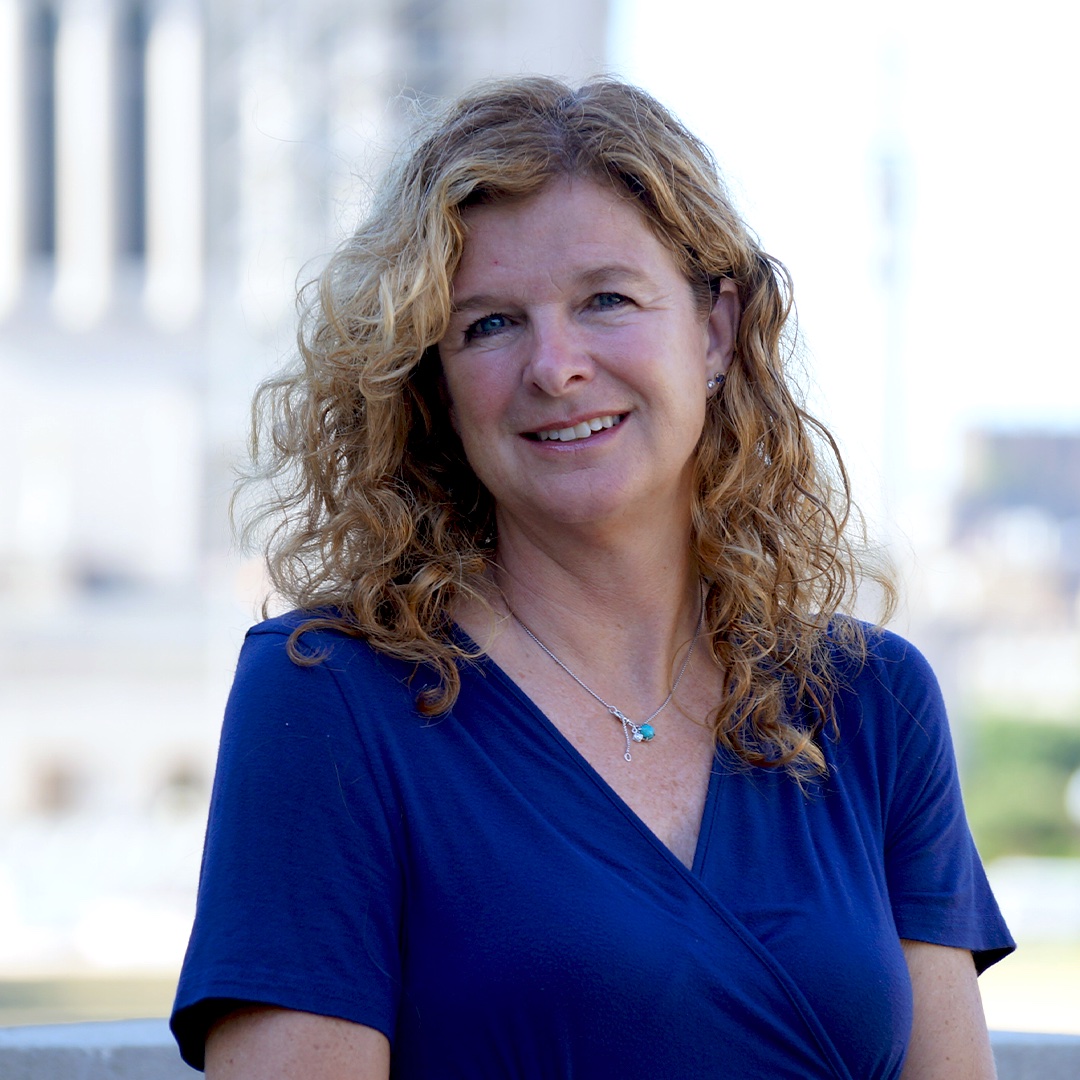
Transcript
Michael Schmierer [00:00:00]:
Today is a somber day marking the 23rd anniversary of September 11, 2001. We take a moment to honor the heroes and victims of that tragic event. Their courage and resilience continue to inspire us all.
Why do workforce development efforts often feel fragmented and siloed? What if we could revolutionize the way we develop and support our workforce, using data and technology to bridge skills gaps and drive economic growth? As director of workforce and economic development here at Resultant, these are the questions that I ask myself frequently, which is why we're here. I'm Michael Schmierer, and this is my takeover of Data-Driven Leadership. In this four-episode miniseries, I'll be joined by several industry experts as we discuss how data and technology can transform workforce systems, enhance job matching, and support workforce readiness. The goal is to provide you with valuable insights and practical strategies that can help drive transformational change, inspire action, and foster collaboration among stakeholders. You won't want to miss this. Let's dive in.
Michael Schmierer [00:01:03]:
In this episode, we talked to Sarah Harrison, vice president of engagement at INvets. INvets is an awesome organization that helps separating military members and their families find meaningful work in Indiana. We talk about their mission, how they go about their work, including how they leverage technology to match veterans with meaningful work and jobs in Indiana. Super excited about this conversation and hope you all enjoy it.
Michael Schmierer [00:01:40]:
Sarah, welcome to the show.
Sarah Harrison [00:01:42]:
Thank you for having me.
Michael Schmierer [00:01:43]:
This episode is coming out on 9/11, and a lot of organizations are honoring our veterans today, and your organization does that every day. Can you just take a moment and discuss the importance of remembering a day like today and how it impacts your approach and INvet's approach to supporting veterans?
Sarah Harrison [00:02:01]:
I can to a degree. It's a horrendous mark in history, 9/11, and I think the important things that came out of that was an increase in patriotism in what is already a patriotic country. I think what tied along with that wasn't just the purchase of more flags and flying the flag, but it was a lot of people decided to enlist after that episode to help with the protection of their own country. That was 23 years ago. Some of those people who enlisted are probably retirees now, 20 years into a military career. One of the things that we learned from 9/11 was that national security is not given. There are always situations that arise that you can't anticipate. Many people came out of that situation with PTSD, which the incidence of that was way higher than in the general population.
Sarah Harrison [00:03:02]:
So PTSD people leaving military service are things that we at INvets deal with every day as we try to facilitate a smooth transition from military life back to civilian world. But it doesn't drive everything we do right now. We are looking after veterans every day of the week.
Michael Schmierer [00:03:26]:
Meaningful work is always one of those things you hear about being something that helps people that might be dealing with difficulties in their life overcome. You kind of touched on it. But any other unique challenges veterans face when transitioning from the military to a civilian career?
Sarah Harrison [00:03:44]:
If we had a room full of veterans here and you asked each one of them individually, what is the most difficult thing, what you miss when they move into the civilian world? It is the camaraderie that comes with being in the military sometimes refer to it as trauma bonding. They go through an awful lot together. Sometimes it's different in the civilian world. In the military, you work as a unit, so you are moving towards a goal that is shared by the unit that you're in at that time. You move, pulling everybody with you. In the civilian world, many times there's an organization has a goal, but within that, sometimes people are very intent on making sure their own individual goals are met career wise. And they don't always work as a team. They'll do what it takes to get ahead.
Sarah Harrison [00:04:44]:
And I think some of the military find that difficult. It's not an environment…it's not that very strong teamwork that they get when they're serving. So I think that's one of the issues. I think also they'll say that people, civilians often think that all we do all day is run around with a gun and that everybody has PTSD, and that couldn't be further from the truth. You know, there's an awful lot of PTSD in the general population, usually related to road traffic accidents and that type of event. But I think when you join the military, you know what you're going to put on in the morning, where you're going to go, what time you need to be there, what time somebody's going to produce food, whatever caliber that might be. So they know where to go for health, they know where their paycheck's coming from.
Sarah Harrison [00:05:32]:
They know if they do this period of time, they will get promoted, they will be at this rank, and they will get paid. This Brian Evans, our, you know Brian, he's our outreach director, he tells the story that when he first had an interview, when he was coming out, got to the end of the interview, and the interviewer asked him what kind of salary he was looking for, and he said, I didn't have a clue how to answer that question because there was never negotiation in the military so things that we take or the civilians take for granted, it's not the same for them. So it's like when they come out, it's not just changing job, it's changing life, living quarters, everything.
Michael Schmierer [00:06:20]:
Complete lifestyle change. And you touched on this kind of jokingly about running around with a gun. But there's a lot of skills that people learn in the military that the civilian world might not understand or know how to translate. Can you speak to that a little bit?
Sarah Harrison [00:06:35]:
I think people have to think of the military as, it's a whole ecosystem in there. Medics, you've got financial people, you've got logistical people, you've got it. Engineers, you name it, it's in there. The jobs that they do are not always called the same thing. I was talking to a lady who was recruiting for a project manager, and I sent her some resumes for some of the people that we were serving, and her response was, they don't have the PMP. No, they don't. But they have moved thousands of troops, millions of dollars of equipment halfway across the world, and there is no option to fail. They have to do that and succeed.
Sarah Harrison [00:07:20]:
That's project management on steroids. I think it's hard for both parties to translate what those skills mean from being the military person going into the civilian world. And sometimes we get resumes, and we talked earlier about acronyms. Nobody knows what you're talking about. And also for the civilians, it's necessary for them to be able to understand what they're talking about. And if they don't understand, ask.
Michael Schmierer [00:07:48]:
We're in Indianapolis. There's many people in Indianapolis or in our state of Indiana that know about INvets and the work that you're doing, you know, helping veterans make that transition. Can you just talk to the mission and the vision of the organization, maybe the background of how it got started, how you served that population?
Sarah Harrison [00:08:04]:
Yes, for sure. Well, a little bit of the history. Wes Wood was the gentleman who founded INvets. Wes was a former sniper. And, you know Wes, too. It started under the umbrella of Conexus, which is under the umbrella of CICP. Just a side note, Wes was a sniper, and in his office in the building, he used to have a telescope, didn't he?
Michael Schmierer [00:08:26]:
He did, yes.
Sarah Harrison [00:08:27]:
And I said, what are you looking for out there, Wes? Across Indianapolis, old habits die hard. You never know. So he did start INvets, and initially it was with five manufacturing companies in connectors. We were working with manufacturing logistics. Wes saw that there was a place, there were a lot of shortages of workers in manufacturing and logistics. And the idea started with five companies, big automotive companies, largely. And it was, if you like, a project initially. And then the lieutenant governor, Suzanne Crouch, was looking for an initiative with veterans, and he, along with other people, had to go and present his ideas.
Sarah Harrison [00:09:11]:
But the good thing about that for him was it was already up and running, so it was working anyway. He was very lucky and received funding through the DWD from the lieutenant governor's.
Michael Schmierer [00:09:25]:
Office, the Department of Workforce Development here in the.
Sarah Harrison [00:09:28]:
Yeah, sorry, another acronym. So that's how it started, really. The mission is for INvets to work with. I'm not going to give you the ultimate definition, but essentially we work with transitioning military veterans, their spouses, and their families to facilitate an easier transition into civilian life, which then ultimately has an economic impact on the state because you're moving families into the state. So the vision, if you like, just to piggyback off that, is that we would like to be the point where the military think about INvets and Indiana as being the state to go.
Michael Schmierer [00:10:12]:
It's an important population to think about, not only because we want to support our veterans, but there's a talent supply shortage across the country, and we need organizations like yours to help with every population, to try to help not only the companies, but more importantly, I think the people make that transition, have a meaningful career, have a living wage, quality of life. Part of what INvets does is kind of boots on the ground, to use a military term, kind of recruiting people to the state. But you also have a platform that you leverage. I'm wondering if you could talk a little bit about what types of data you use in your platform to help place people or recruit people to the state.
Sarah Harrison [00:10:51]:
Sure. Well, the platform essentially has three portals. Okay. There's one for veterans and transitioning military to sign up for. There is one for organizations, companies. INvets has over 600 corporate partners.
Michael Schmierer [00:11:06]:
Oh, wow.
Sarah Harrison [00:11:07]:
And this is not to denigrate anybody who's partnering with us. It's the bell curve. You know, you have some people who are signed up and don't work with us as much as we would like. Some people at the other end are all over it and then chunk in the middle. But they build a profile on the platform and they post jobs or career positions on there. I'll come back to that in a minute. But then the other portal is the community portal. So we have 92 counties on the platform that are live.
Sarah Harrison [00:11:38]:
The county is responsible for building the data on that page that they have, so that if you like, it's their marketing material to recruit people to live.
Michael Schmierer [00:11:49]:
And 92 is all counties in Indiana. Every county, yeah.
Sarah Harrison [00:11:52]:
Who knew? You can list them now, but, yeah. So there's three portals. And the way it works is if the companies post their jobs, if you were looking for a position, say you wanted to do logistics, you could put in the search bar, logistics, supply chain, warehousing, whatever it is, and any of the companies who have those positions open would then spill out of the search. And the transitioning military can look through those and see, review the job, see if they want to apply. By the same token, if you're a company and you're looking for a logistics person, you put that in, and then you'll have a list of veterans, transitioning military spouses who are looking for those positions. And we ask that they upload their resumes so that it's an easy connection point. It can happen independently. I always say humans are fallible.
Sarah Harrison [00:12:52]:
It doesn't hurt to steer from the rear. So what we do now, we have five regional veteran engagement managers and one engagement manager who covers the whole state for veterans who already live here. So those veteran engagement managers will liaise with anybody who signs up. And what I should probably back up a little bit and say, what we do is we’re one of the only organizations serving veterans that travels out of state to recruit back into state. Okay. I think at the board meeting this morning, we had 104 visits in Q four. That's people that go out to the bases. The idea is that we offer a transformational rather than transactional service.
Sarah Harrison [00:13:42]:
You go, you show up at the table, we talk to you. When you look at the statistics and numbers, I think it's about 200,000 leave the military on an annual basis, 20 odd percent go home. So obviously, if we meet somebody says, oh, I'm from Indiana, I recognize you guys. And then that's what we might call low hanging fruit. Then 20 odd percent will stay at their final installation, which makes sense, because if you served a long time, you might have kids in high school. Nobody in their right mind wants to move a child in high school. And then the 48% around there are open to the right position to live a good quality of life. Their definition, where their money goes a little bit further, and a state that has good state benefits for veterans, which Indiana does offer those.
Sarah Harrison [00:14:39]:
So when they're all in the platform and we connect them, the case managers, the veteran engagement managers, also help. So if you applied for a job, you tell me that you've applied, and then I reach out to the company and say, this is Michael. He's applied for this job. This is his resume. You know, please, will you review it? He's one of ours.
Michael Schmierer [00:14:57]:
So white glove service, for sure, and leveraging all that data and technology to make those matches that help people get the jobs that they're seeking. I'm sure you've had a ton of success stories throughout the years, wondering if you just share one or two that stick out to you, the most of people leveraging your platform or running into you and relocating here to Indiana.
Sarah Harrison [00:15:18]:
And it's always exciting if you bring in somebody who's not from Indiana. You know, one of our case managers, Dana, was. He works in the northwest now. He was in Florida and met a young man, Woody, who was coming out and wasn't quite sure where and what he was going to do. And, you know, all these people have, you know, they're the tip of the iceberg. You know, there's the family and everybody else underneath. It's not just moving one person. And they had.
Sarah Harrison [00:15:47]:
He had some family health issues. Woody's from Haiti. Really smart guy. Worked in intelligence, I think, if I remember rightly. Anyway, he ultimately, after a lot of interviews and everything else, finally got a position at Wabash as a supervisor on one of the lines in Wabash. And they love him because he's organized. You know, veterans work very well in adverse conditions as well as good conditions. They make decisions, they see what needs to be done, and they do it.
Sarah Harrison [00:16:22]:
Woody is no exception. He's increased production on two lines since he's been there. And, in fact, there is a video out there where Woody's been interviewed, and he loves it there, and they love him there. In fact, actually, it was Dana again, he went out to Hawaii. Okay. That was our first time there last year, and he's brought three people back to the state. One of them had never been in Indiana before.
Michael Schmierer [00:16:49]:
So that's a big transition.
Sarah Harrison [00:16:51]:
It is, yeah. Why? To Indiana? Yeah. I mean, it is. But there's so many stories like that. People come in and do all sorts of different jobs. We work with the spouses as well, and I always say boomerang kids that still are traveling or moving with parents. If you. Going through a transition is a lot.
Sarah Harrison [00:17:11]:
The one thing we don't want to do is have a failure in finding the right position for that person, because, again, the whole family's affected, you know, can you imagine moving everybody here and then saying, well, actually, I don't really like the job I've got, and we need to move somewhere else. That's an awful lot of disruption that causes a lot of emotional turmoil and everything else. So we try to really find the best fit, which takes a lot of questions, listening, talking, and forming really good, strong partnerships with the companies as well as the veterans that we're working with.
Michael Schmierer [00:17:50]:
Yeah, I'm glad you hit on the company side there. Right. Like, companies play such a huge role in workforce development and, you know, advancing people's careers and having them engaged throughout this process, I'm sure it has to happen or else, like you said, failed transitions don't do any, any good for the person that's making that move.
Sarah Harrison [00:18:11]:
Right.
Michael Schmierer [00:18:11]:
Let's talk a little bit about the future. Where's INvets going next? Any big plans for the company in the future?
Sarah Harrison [00:18:17]:
Well, we're staying here.
Michael Schmierer [00:18:19]:
That's good.
Sarah Harrison [00:18:21]:
We're not leaving. I think INvets is evolving all the time. You know, really, we're a young company. So I explained earlier that we were funded by the lieutenant governor last year. We were able to secure some additional funding. Prior to that, we had two veteran engagement managers who were doing the travel and the case management. That was a lot and, you know, very difficult to sustain effectively.
Michael Schmierer [00:18:49]:
Yeah.
Sarah Harrison [00:18:50]:
And one thing we don't want is people out there that are not served correctly. You know, we. I say to the team all the time, we serve these people, it's very important we meet them. We always say we meet them where they are. So now that we increased the number of engagement managers, we are able to serve them much more efficiently. You know, we brought in. Just because I know you like data.
Michael Schmierer [00:19:13]:
Yes.
Sarah Harrison [00:19:14]:
We. Last year, our target for new residents, which is obviously a veteran and family. Yeah. The target was 425, and we brought in 491. Okay. The economic value of bringing those people in is approximately 9 million for one year. Yeah. That's a big return on the investment.
Sarah Harrison [00:19:40]:
You know, that's good for the state. But what it means as well is that it's great for those families. We're giving them a new start. We're helping them into a new life. So what are our plans? We'll keep doing that. One of our main focuses as we move forward is that we want to be more, if you like, self sufficient in terms of funding. It's a great expression. You don't want all your eggs in one basket.
Sarah Harrison [00:20:07]:
And Blaine Zimmerman, who's the president and CEO, has been very intentional about bringing on more donors and working with the foundations across the state. So that is looking promising.
Michael Schmierer [00:20:23]:
It's a great segue into where I was going to go next, but what can people do to help support your organization or other veteran organizations in their community, whether they be in Indiana or elsewhere in the country, to help continue to support our veterans that are transitioning from the service to the civilian world?
Sarah Harrison [00:20:43]:
I think that sometimes there's some confusion between helping veterans transition and settle and recognizing veterans. I think Blaine, if he was in my chair today, would say he was talking to a mayor in one of the towns who said, oh, well, yeah, we really love our veterans. You know, we do lots for them. And he said, well, what do you do? He said, well, we put flags out, which is nice because that's recognition, and it's not to undermine that. But these people have served our country. And I know I have an English accent, but I am an American citizen.
Michael Schmierer [00:21:16]:
And served your country.
Sarah Harrison [00:21:18]:
And I served my country as well. Yeah, that's one thing I should say. Everybody that's on the veteran engagement team is former military, so it's an interesting group to manage. So I think it's a matter of not everybody has PTSD. They have amazing skills and amazing qualities, which would be of a huge benefit to corporations in America today. They have a strong work ethic. They show up on time. I said before, they're decision makers, problem solvers.
Sarah Harrison [00:21:48]:
People sometimes think because you've been in the military, you don't do anything unless you're following orders. It couldn't be further from the truth. And the other thing is, they're lifelong learners. You know, in the military, they tell you where you're going to go next. You can say, well, I don't know anything about that. And they'll probably say, well, you will soon. You know, and also, the way it's set up now, in order to get the next rank, they often have to do higher education. So these people are extremely well qualified, a lot of them, and that, you know, obviously it goes from a high school to diploma through associates to bachelors to post grad.
Sarah Harrison [00:22:20]:
They are very good workers, and I think it's just trying to understand what their roles were. And I would say the same to the veterans if they were here. You have to understand it's not the same vocabulary. It doesn't mean that what you can do doesn't match what the company's asking for. You have to just find the common ground and talk through what it is and welcome them into the community. Not every person who comes out of the military wants to be really active in the American Legion or whatever else it is. They just want to join the community and these people, it's like having an MVP. Everybody knows that acronym.
Sarah Harrison [00:23:00]:
It's like having an MVP in your community because they want to belong to something that is bigger than themselves. That's what they're used to. So they will be the people who volunteer here. You know, they'll be the coaches at the school. They'll join in Keep Indianapolis Beautiful. They'll want to participate and be involved and part of the community.
Michael Schmierer [00:23:21]:
That's awesome. I've really enjoyed our conversation. I'm wondering if there's anything else that we have not touched on that you'd like to talk to today.
Sarah Harrison [00:23:28]:
I think probably one of the other aspects I will just mention is that we partner with Happy LLC, which is a frictionless mental health organization. And that's. I've just said not everybody has PTSD, but like all of us in life, when things are changing, it can get stressful. You're moving from the known to the unknown. So Happy is a company that actually reaches out to transitioning military veterans. So the way we work with them is that when people are coming out, then we share the contact details of those people and they will proactively reach out and just call. They do a series of emails so that people know that this is coming and they'll recognize the telephone number and they'll just call, say, hey, how are you? Yeah, you know, is there anything you need help with? What can we do? And we did a pilot before I joined, which was in February ‘22, but that organization had a direct impact on saving several people who were at the end of their rope. And so we just.
Sarah Harrison [00:24:35]:
I think we're just signing the contract again for this week, for this coming year.
Michael Schmierer [00:24:40]:
That's amazing. It's great to hear all the things that INvets and your partners are doing to help not only the veterans here, but the veterans that don't know about our great state yet and have ample opportunity to come here and make a good life and good communities with, with good jobs. So we really appreciate you taking the time today to be with us. To hear more from Sarah, be sure to follow her on LinkedIn. Additionally, you can stay updated on the latest initiatives and resources for veterans by following INvets on LinkedIn and other social media. As always, thank you for joining us on Data-Driven Leadership.
Don't forget to follow Data-Driven Leadership wherever you get your podcasts, and leave us a rating and review to let us know how these data topics are transforming your business. Be sure to check out the rest of our workforce miniseries where we will explore the future of workforce development and innovative career preparation strategies, just like today's episode.
Michael Schmierer [00:25:38]:
Thank you for listening to my takeover of Data-Driven Leadership. For more on me and Resultant, check out the links in the show notes.
Insights delivered to your inbox



